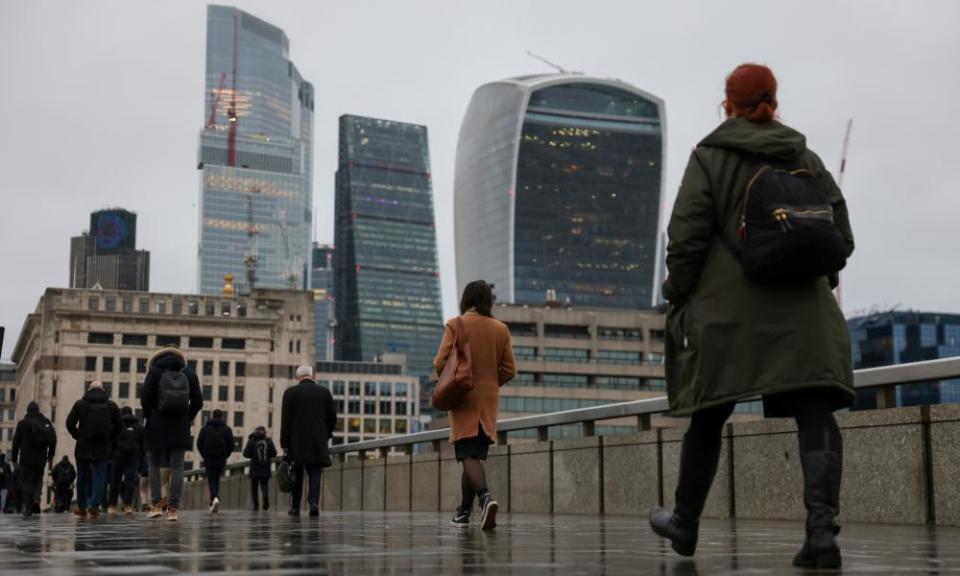OBR halves UK growth forecast and warns inflation will exceed 2% target until 2025

The government’s official forecaster has slashed its predictions for economic growth over the next two years, and warned that inflation could take until 2025 to come back to the official 2% target.
In an updated financial health check to accompany the autumn statement, the Office for Budget Responsibility (OBR) said a more resilient economy this year had handed the chancellor a £27bn budget windfall, but it warned of a more difficult outlook up to 2028 than previously forecast at the time of the budget in March.
Gross domestic product (GDP) will rise this year by 0.6%, beating the previous forecast of a 0.2% dip, the OBR said.
However, growth will then be more muted than expected: 0.7% in 2024 and 1.4% in 2025. The OBR had predicted in March there would be a rebound to 1.8% in 2024 and 2.5% in 2025.
Inflation is now not expected to come back to the Bank of England’s official 2% target before the first half of 2025, a year later than previously forecast. An inflation rate that was due to average 0.5% next year will instead be 2.8%, the OBR said.
In disappointing news for homeowners, the OBR forecast house prices would grow by 0.9% in 2023 but then fall by 4.7% in 2024, as interest rates remain higher for longer.
Lower economic growth and higher inflation than previously expected would limit the government’s room for manoeuvre over the next five years, it said.
The OBR calculated Hunt had spent his entire £27bn windfall on business tax cuts, inflation-linked uplifts to benefits, and on a 2p cut in employee national insurance, which is due to take effect from 6 January.
Richard Hughes, the chair of the OBR, said research by the Institute for Fiscal Studies showed chancellors spent 60% on average of a budget windfall.
“This chancellor has spent 100% of his windfall,” he said.
Paul Johnson, director of the Institute for Fiscal Studies said that announcing immediate and long-lasting tax cuts in response to highly uncertain changes in assumptions about the UK’s medium-term economic prospects “does not feel like a recipe for good management of the public finances”.
However, a more buoyant economy in 2023, which generated tax receipts far in excess of previous forecasts, allowed the government more financial headroom.
Hunt said that a tight settlement with government departments, limiting their spending over the next five years, would also play a role in allowing the government to bring down the annual spending deficit in each of the next five years.
A deficit this year of 4.5% of GDP is due to fall to 2.7% in 2025 and to 1.1% in 2028-29 and leave £13bn of headroom compared with just £6.5bn of headroom the chancellor left himself in the March budget. Chancellors typically leave themselves £25bn of headroom to cope with changes in interest rates and inflation without needing to change tax and spending policies.
The squeeze on public spending, which amounts to £19bn in real terms, posed the biggest risk to the public finances, the OBR added.
Meanwhile, households are expected to suffer the “largest reduction in real living standards” since records began in the 1950s, the OBR said. Real household disposable income per person is forecast to be 3.5% lower in 2024-25 than before the pandemic. The drop is smaller than forecast in March, and the OBR now says incomes will recover by 2027-28, with the 2p cut to national insurance tax adding 0.5% to household incomes.
Many economists have criticised the Treasury for focusing on reductions in the annual spending deficit rather than measures, including public investment, to boost growth.
A freeze in the cash spent on public investment will prove to be a blow to the economy’s long-term health, the Institute for Fiscal Studies (IFS) said.
Johnson, from the IFS, said: “We already have public sector investment well below that in most comparable countries. That is not good for growth.”
Private sector businesses will benefit from a £9bn commitment to make permanent “full expensing”, which allows firms to offset purchases of plant and machinery against profits, lowering their tax bills.
The OBR said this move would increase private sector investment by only £3bn. All the cuts in business taxes will amount to a £20bn loss of income by 2028 that David Miles, the OBR’s head of economics, said would have a negligible effect on growth ober the next five years.
In its assessment of welfare-to-work programmes, including childcare subsidies, the OBR said they could add 200,000 people to the workforce by 2028.
Johnson posted on X, formerly Twitter: “Quite something that benefit changes plus childcare and other reforms announced in March budget judged by OBR to increase numbers in work by 200,000.”
Though he added: “Most benefit reforms which have increased numbers in work have very largely got them into low-paid, part-time work, still on in-work benefits.”
Jonathan Gillham, chief economist at PA Consulting, said tax cuts for business will benefit the economy “and our view is that these will play out with much bigger economic benefits than then OBR are suggesting”.

 Yahoo Finance
Yahoo Finance 